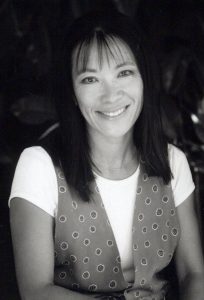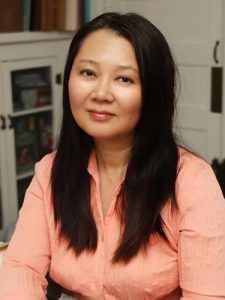Poet Amy Uyematsu, journalists William Hiroto, Martha Nakagawa die.
By P.C. Staff
William T. Hiroto, Amy Uyematsu and Martha Miiko Nakagawa — three Japanese Americans known for their facility with different genres of the written word — have died recently.
A journalist, Hiroto — who was born in Riverside, Calif., and died in Los Angeles on June 23 at 94 — was known by his friends and readers by the nickname “Wimp” and “Wimpy.” During the latter years of his life, he contributed a column titled “Crossroads to Somewhere” to the Rafu Shimpo. His last column appeared in the paper’s June 16 issue.
“Crossroads” was a reference to the defunct all-English Japanese American community newspaper founded in 1948 of the same name where he served as its editor. Crossroads met its demise in 1971.
Prior to serving in the Army, Hiroto was incarcerated at the Poston WRA Center in Arizona during WWII. He later graduated from the University of Southern California with a journalism degree. In 2023, he was among of group of Japanese American military veterans who were recognized by USC for their military service.
During his stint as a Rafu Shimpo columnist, among the topics Hiroto wrote about was his journey from living independently to becoming a resident of the Keiro Retirement Home, later named Sakura Gardens, part of the renamed former Keiro facilities after its sale to Pacifica Cos. He also wrote about the ensuing controversies that arose following the sale from his perspective as a resident. In 2016, Hiroto was named as one of 12 representatives to serve on the Community Advisory Board that was created by the California Attorney General’s Office following the sale.
Among Hiroto’s career achievements was serving as the executive director of the Gardena Valley Japanese Cultural Institute and Japanese Cultural Institute Gardens apartments, as well as serving in an executive capacity with Yamato Restaurants.
Hiroto was predeceased by his wife, Margaret, and brother, Edwin Hiroto. He is survived by his sons Russell (Jill) Hiroto and Jeffrey (Carol) Hiroto; brother Donald (Betty) Hiroto, five grandchildren and many nieces and nephews.
❖❖❖
An award-winning poet and Culver City, Calif., resident, Uyematsu died June 23 after battling cancer for two years. She was 75.

Amy Uyematsu
Uyematsu was born and raised in Southern California in the years after her parents were released from incarceration at the Manzanar (California) and Gila River (Arizona) War Relocation Centers.
A Sansei, Uyematsu authored six poetry books: 1992’s “30 Miles from J-Town,” for which she won the Nicholas Roerich Poetry Prize; 1997’s “Nights of Fire, Nights of Rain”; 2005’s “Stone Bow Prayer”; 2015’s “The Yellow Door”; 2016’s “Basic Vocabulary”; and 2022’s “That Blue Trickster Time” (2022).
Prior to that, she authored a seminal essay titled “The Emergence of Yellow Power in America” that appeared in the newspaper Gidra in 1969. (See tinyurl.com/3ua38jxh.) She also contributed to “Roots: An Asian American Reader,” a seminal textbook used in Asian American studies programs.
After graduating from UCLA with a bachelor’s degree in mathematics, she a taught that subject for more than three decades in the Los Angeles Unified School District before retiring.
Her younger sister, Mary Uyematsu Kao, reflected on her sister’s “superachiever” life. In an email to the Pacific Citizen, Kao wrote: “As years went by, her movement activism found a loving home in the poetry community. Her voice was uplifted, and a symbiotic love created the legacy she has left us with today—her six poetry books and the historic frontrunner of Asian American texts — ‘Roots: An Asian American Reader.’
“ ‘Roots’ was used by Asian American students all over the country as the basis for starting Asian American Studies at their college campuses. ‘Roots’ went through 19 printings. While Amy [Tachiki] shared co-editor status with Eddie Wong, Franklin Odo and Buck Wong, Amy was the driving force to see the project to completion as the UCLA Asian American Studies Center’s first publications coordinator.”
She had been active with Pacific Asian American Women Writers West and in 2012, the Friends of the Little Tokyo Branch Library honored Uyematsu for her contributions to the Japanese American community as a writer.
Uyematsu’s survivors include husband, Raul Contreras; son, Chris Tachiki; mother, Elsie Uyematsu Osajima; and sister, Mary Uyematsu Kao.
❖❖❖
Nakagawa, 56, died on July 28 in Los Angeles less than two weeks after visiting the hospital for what she thought was a lingering stomach flu. She received the diagnosis of cancer on July 16 — her birthday.

Martha Nakagawa (Photo: Mario Gershom-Reyes)
“She was in total shock. She did not see that coming at all,” said her childhood friend, Marie Morohoshi, regarding Nakagawa’s reaction to the medical results. She added that Nakagawa had a recent mammogram and at that time there were no early indications of cancer.
Nakagawa’s journalism career included a five-year stint at Pacific Citizen (October 1998-June 2003) as assistant editor, as well as working on staff at Asian Week and Rafu Shimpo. She also contributed to Hawaii Herald, Nikkei West, Nichi Bei Times and Hokubei Mainichi. According to Pacific Citizen board Chair John Saito Jr., Nakagawa also worked in the P.C.’s circulation department circa 1989.
Describing Nakagawa as “a great reporter, hard-working and very productive,” Colorado-based Gil Asakawa, who served as the Pacific Citizen board chair during a period that overlapped with her stint with the paper, he said, “My recollection is that she was a good, diligent journalist whose voice was important to the P.C., and I enjoyed her stuff in all the other publications.”
Nakagawa was a graduate of Gardena High School and Stanford University, and was the only child of Shigako Nakagawa, a Shin Issei, and Akio “Lawrence” Nakagawa, a Kibei Nisei born in the Sacramento Delta region of California. During WWII he was incarcerated, first at the Topaz War Relocation Center, and later at Tule Lake after answering “No-No” to the government’s infamous loyalty questionnaire. Her parents both hailed from the same hometown in Japan’s Wakayama Prefecture and met via omiai (introduction). According to Morohoshi, Nakagawa’s parents had never met previously but their families were neighbors.
Noted author and novelist Naomi Hirahara, when she was editor of Rafu Shimpo, hired Nakagawa in the 1990s before she her stint Pacific Citizen. “There was an opportunity to hire someone and that’s when I hired Martha because she was fully bilingual,” she said.
Hirahara recalled that Nakagawa had written about her father in an essay for the Japanese American Historical Society of Southern California (later republished on the Discover Nikkei website), and was “very sensitive” about people conflating the Japanese American community’s so-called “No-Nos” and “resisters of conscience,” meaning those who resisted military conscription on constitutional and civil liberties grounds.
For Nakagawa and her keen instincts on injustices visited upon people by indifferent, as well as intentionally hostile institutions, writing about and reporting on marginalized, overlooked, underserved, unpopular, unrecognized and disenfranchised individuals and communities within the larger Japanese American community was a constant theme and raison d’être for her interest in journalism.
In addition to “No-Nos” and resisters of conscience, Nakagawa reported on the challenges faced by Latin Japanese Americans seeking redress, “maverick” Japanese Americans like Cedrick Shimo, Tule Lake incarcerees and the “Bronzeville era” of Little Tokyo during WWII. There were times, however, when Nakagawa’s pursuit of those stories did not endear her to some within the JA community.
In a 2021 video interview conducted by Nichi Bei Weekly editor-in-chief Kenji Taguma of another Nikkei community journalist, Takeshi Nakayama, and Nakagawa, she recalled the flak she encountered regarding some of articles she wrote.
“When I started writing about the draft resisters at the Pacific Citizen, I started getting phone calls and office visits from JACL members who were staunchly against apologizing to the draft resisters. But I didn’t stop writing about them and because of that, I was, you know, called anti-JACL, anti-veteran, people were calling for my firing,” Nakagawa recalled in the video.
“But I did keep writing about them, because I felt like this topic had to be documented, and I wanted to contribute in my own small way to the debate over whether the JACL should apologize to the draft resisters. And, and on a bigger level, this issue is really important, because it deals with the constitutionality of drafting men out of the U.S. concentration camps, which were basically prisons.”
Nakagawa explained that also at issue were limits of the war powers of the president and Congress, and the meaning of U.S. citizenship vis-à-vis whether “you are a person of color in comparison to if you’re an American citizen if you are white.” (To view the video, see tinyurl.com/yuz7fuja.)
Also in the video, Nakagawa recalled how “we had to have a meeting over a decision I made to put a particular story on the front page of the Pacific Citizen.” She was referring to when the Pacific Citizen had in the lead spot on page one a story in the Sept. 15-21, 2000, issue an article about the documentary “Rabbit in the Moon” — which was less-than-flattering in its description of JACL during WWII — winning an Emmy on Sept. 6 (See tinyurl.com/4kcwh3nh). She made the decision to place the article in the lead spot while the paper’s then-executive editor was on leave.
Frank Abe, himself a journalist, documentarian, graphic novel writer and cultural critic told the Pacific Citizen, “I still can’t believe she’s gone.” Though “devastated” by her death and the loss of her “encouragement, support and the loss of all the worked that she still had ahead of her,” he took some solace that “her work will be long remembered.
Writer Barbara Takei, an officer of the nonprofit Tule Lake Committee, described Nakagawa as “very gutsy” and “courageous” for “using her skills and her talent to tell the stories” of resisters and others. Morohoshi noted that Nakagawa was both “very sharp and fierce and a clear thinker” who was also “supergentle” and “loving,” a person who loved animals and helped nurture Monarch butterflies.
In addition to journalism, Nakagawa had worked as a contractor for UCLA’s Asian American Studies Center, performing tasks such as cataloging the collection of Aiko Yoshinaga Herzig. Before the time of her death, she had been working for Noh Foods of Hawaii.
Even though she was not a fan of John Okada’s novel “No-No Boy,” Abe was happy to include Nakagawa’s essay in the 2018 book he co-edited, “John Okada: The Life & Rediscovered Work of the Author of ‘No-No Boy,’ ” which sought to unveil some of the mystery surrounding the author of the novel “No-No Boy.” (See Pacific Citizen, Feb. 22-March 7, 2019.)
In her last contribution to the Rafu Shimpo, in its Aug. 6, 2023, issue, she reviewed Warren Furutani’s book, “ac-tiv-ist,” which was the cover story of the Pacific Citizen, March 24-April 26, 2023, issue.
In the Nichi Bei Weekly video, Nakagawa related what motivated her journalistic endeavors. “If we don’t write about this, this history gets lost. … that that kept me going,” she said.
Nakagawa was predeceased by her parents and is survived by her friends, life partners and many nieces, nephews and other relatives in Japan.
At 11 a.m. on Sunday, Aug. 27, a celebration of life service for Nakagawa is scheduled to take place Fukui Mortuary, 707 E. Temple St., Los Angeles, with a reception to follow.



